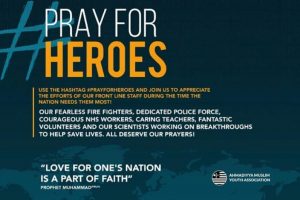Shahzad Ahmad, UK

The Review of Religions speaks to Jeanet Sinding Bentzen,an associate professor in the Department of Economics at the University of Copenhagen, Denmark, and executive director of the Association for the Study of Religion, Economics and Culture about her latest research on the relationship between prayer and natural disasters.
Be it physical, emotional or financial, the reverberations of the sudden jolt of Covid-19 continues to be felt at every level of society. The world is indeed passing through turbulent times that are unparalleled in our recent history. And while Covid-19 may well be a completely novel and unique virus and has presented challenges of its own, the phenomena of natural calamities is certainly not new. Just a cursory glance into our not so distant past and news of earthquakes, storms, droughts and floods is almost a common occurrence. Although the nature of each of these calamities determines what course of action we adopt and how we respond – as is evident with the current pandemic – however, there is one particular response that is universal and consistent – prayer!
Expounding upon this, Hazrat Mirza Ghulam Ahmad(as), the Founder of the Ahmadiyya Muslim Community, states,
“…Prayer, which accords with our natural state, begins from the time when signs of grief, pain and agony arise in a person. When a person is afflicted by some calamity or misfortune, they show immense humility and meekness. At this time, if there were an earthquake, you could appreciate how emotional and humble one’s disposition becomes.”[i]
The outbreak of Covid-19 is no exception, and if anything, it has demonstrated more than ever before that to supplicate and pray is an innate yearning and an intrinsic part of our lives.
In her recent study, “In Crisis, We Pray: Religiosity and the Covid-19 Pandemic”, Jeanet Sinding Bentzen found “that google searches for prayer rise in response to the COVID-19 crisis.” Bentzen collected daily data from Google searches across 95 countries which demonstrated an increase in people searching for prayer “to the highest level ever recorded” during Covid-19.
The direct correlation between natural disasters and an increase in religiosity is indeed a fascinating find and “an example of religious coping” and how “people use religion to cope with adversity” explained Bentzene who told me:
“As an economist I have long been interested in identifying the roots of economic differences. This has brought me to research our cultural values and religion, which both shape our actions, potentially also our actions as economic agents.”
Jeanet’s research is not just limited to the impact of Covid-19, but in earlier studies she also found “increases in religiosity after earthquakes, tsunamis, and volcanic eruptions.”
The current global pandemic, however, has traversed borders and boundaries and draws no distinction of age or ethnicity. However, Bentzen mentioned that in her most recent research, which has not yet been published that “poorer, more unequal, more uncertain, and of course also more religious countries tend to use religion more to cope with the COVID-19.”
But despite the socio-economic factors, a more important question is, how long does their sense of religiosity remain after a calamity has passed or is it just a momentary response? Elaborating upon her research in this regard, Jeanet had a very interesting insight and stated, “For the research on earthquakes, I find that religiosity increases the most during the following 3-6 years after an earthquake.”
Thereafter, she explained, “religiosity falls again, but not all the way back to the initial level. There is a small residual of elevated religiosity which is passed on through generations. This I find by looking at second generation migrants living in Europe: Those whose parents come from earthquake-prone areas are more religious, even compared to fellow migrants living in the same country”, said the researcher.
Whilst most natural calamities are localised to particular countries and regions, the outbreak of Covid-19 has indeed taken the entire world into its deadly grasp. The global impact has indeed been like no other, so will humanity as whole show a greater propensity to prayer and what role will religion play in life post Covid-19?
Expounding upon this, Jeanet stated, “I can only guess based on my other research on natural disasters, where the increased religiosity lived on in people. From that, I would expect that religion may play a larger role in the future, particularly in the areas that are already more religious today and areas with more poverty and uncertainty.”
The innate response and sudden change in disposition is indeed in accordance to the nature of man. In relation to this, the Holy Qur’an states:
“And remember when thy Lord brought forth from Adam’s children—out of their loins—their offspring and made them bear witness against their ownselves saying, ‘Am I not your Lord?’ they said, ‘Yea, we do bear witness,’ This He did lest you should say on the Day of Resurrection, ‘We were surely unaware of this.’”[ii]
Indeed, the evidence about the existence of a Supreme Being is embedded in the very nature of man. In our life’s various journeys, we encounter many instances where we spontaneously turn towards our creator. For some, this can be a life changing moment and a beginning of a spiritual quest for the Divine.
Therefore, as countries around the world begin to ease their lockdown measures, society will indeed be very different to as it was before. However, with the passage of time, or with a discovery of a vaccine and cure, many of our recently adopted habits will perhaps be quickly discarded and forgotten.
As we start to take our modest steps towards an era of a “new normal”, let us pause and reflect at this unprecedented time in our lives. Let it not be that we relegate certain practises as mere momentary responses, but instead let’s instil them as a permanent features of our lives – prayer being one of them:
Aye! it is in the remembrance of Allah that hearts can find comfort[iii]
About the Author: Shahzad Ahmad is Associate Editor of The Review of Religions. He also serves as an Imam of the Ahmadiyya Muslim Community. He studied BA English from University of Greenwich. He appears regularly as a panellist on various programmes on Muslim Television Ahmadiyya International (MTA) including on ‘Islamic Jurisprudence’.
[i]Hazrat Mirza Ghulam Ahmad, Malfuzat, Vol. I, p. 146.
[ii]The Holy Qur’an, 7:173
[iii]The Holy Qur’an, 13:29




Add Comment